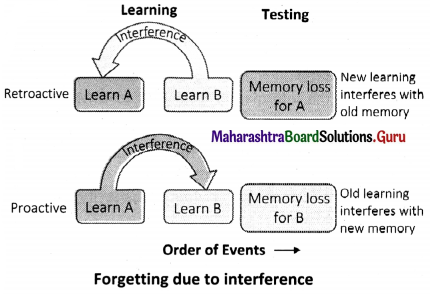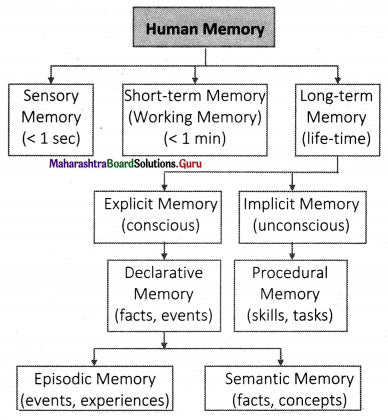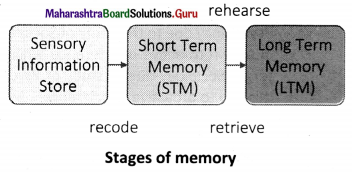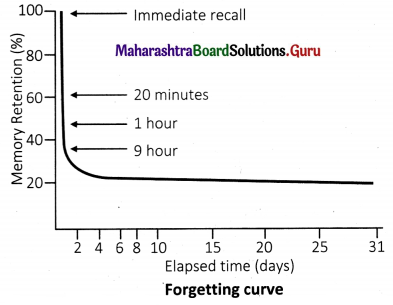Balbharti Maharashtra State Board Class 11 Psychology Important Questions Chapter 8 Memory Important Questions and Answers.
Maharashtra State Board 11th Psychology Important Questions Chapter 8 Memory
1A. Complete the following statements.
Question 1.
__________ is the retention of information over time for the purpose of future action.
(A) Learning
(B) Memory
(C) Attention
Answer:
(B) Memory
Question 2.
__________ plays an important role in storage of memory.
(A) Hippocampus
(B) Amygdala
(C) Nervous system
Answer:
(A) Hippocampus
![]()
Question 3.
The term __________ memory was coined by Miller, Galanter, and Pribram around 1960.
(A) sensory
(B) working
(C) long-term
Answer:
(B) working
Question 4.
Visuo-spatial sketch pad (VSSP) is a/an __________ system.
(A) passive
(B) active
(C) non-functional
Answer:
(A) passive
Question 5.
Autobiographical memory is a type of __________ memory.
(A) implicit
(B) procedural
(C) declarative
Answer:
(C) declarative
Question 6.
In __________ recall, the material is recalled in the exact order in which it was presented.
(A) serial
(B) free
(C) definite
Answer:
(A) serial
Question 7.
__________ is one of the major ways of measuring memory.
(A) Rote learning
(B) Perception
(C) Relearning
Answer:
(C) Relearning
![]()
Question 8.
__________ is the evidence for the organisation of long-term memory.
(A) Serial recall
(B) Tip of the tongue phenomenon
(C) Recognition
Answer:
(B) Tip of the tongue phenomenon
Question 9.
The pioneer of experiments on forgetting was __________
(A) Murdock
(B) Hermann Ebbinghaus
(C) Baddeley
Answer:
(B) Hermann Ebbinghaus
Question 10.
__________ interference means backward interference.
(A) Retroactive
(B) Proactive
(C) Passive
Answer:
(A) Retroactive
Question 11.
__________ is a Greek word meaning ‘of memory or related to memory.’
(A) Mnemonic
(B) Syllable
(C) LTM
Answer:
(A) Mnemonic
Question 12.
The final stage in POWER method is __________
(A) evaluate
(B) rethink
(C) relearn
Answer:
(B) rethink
![]()
1B. Match the following pairs.
Question 1.
| A | B |
| i. LTM | a. Conscious |
| ii. Explicit memory | b. Less than one second |
| iii. Sensory memory | c. Life-time memory |
| iv. Procedural memory | d. Autobiographical events |
| e. Unconscious |
Answer:
| A | B |
| i. LTM | c. Life-time memory |
| ii. Explicit memory | a. Conscious |
| iii. Sensory memory | b. Less than one second |
| iv. Procedural memory | e. Unconscious |
1C. State whether the following statements are true or false. If false, correct them. If true, explain why.
Question 1.
There are four basic processes of memory.
Answer:
False
Reason: There are three basic processes of memory, viz. encoding/acquisition, storage, and retrieval.
Question 2.
Short-term memory is known by many other terms.
Answer:
True
Explanation: Short-term or working memory was formerly known as ‘short term store’. It is also known as primary memory, immediate memory, operant memory, and provisional memory.
Question 3.
Baddeley called LTM the working bench of memory.
Answer:
False
Reason: Baddeley called STM the working bench of memory because STM is the most important stage of memory which is used most of the time for problem-solving.
Question 4.
Very often forgetting is due to unconscious processes like repression.
Answer:
True
Explanation: We subconsciously push unwanted thoughts and memories into our unconsciousness. It is one of the causes of forgetting.
![]()
Question 5.
In recognition, a person has to retrieve information from LTM with no cues.
Answer:
False
Reason: In recognition, a person has to point out or recognize previously learned material that is presented to him in a different context.
Question 6.
There are five levels of motivated forgetting.
Answer:
False
Reason: There are two levels of motivated forgetting, viz. Repression and Thought suppression.
Question 7.
The Method of Loci provides information about how context can affect memory.
Answer:
False
Reason: ‘The encoding specificity of memory’ provides information about how context can affect memory.
Question 8.
There are many techniques for improving memory.
Answer:
True
Explanation: Some of the techniques of improving memory are keyword method, encoding specificity, method of loci, mnemonic devices, practice, and rehearsal, minimizing interference, and POWER method.
1D. Identify the odd item from the following.
Question 1.
Episodic memory, Semantic memory, Autobiographical memory, Implicit memory
Answer:
Implicit memory
2A. Explain the following concepts
Question 1.
Memory
Answer:
According to Tulving, ‘Memory is the means by which we draw on our past experiences in order to use that information in the present. Memory is the term given to the structure and processes involved in the storage and subsequent retrieval of information.
![]()
Question 2.
Central executive
Answer:
The central executive is a supervisor responsible for the coordination of the subsystems and the selection of reasoning and storage strategies in the working memory model given by Baddeley.
Question 3.
Episodic buffer
Answer:
The episodic buffer holds information that is not covered by all other slave systems in the working memory model given by Baddeley. It is a link between working memory and long-term memory.
Question 4.
Autobiographical memory
Answer:
Autobiographical memory refers to episodes recollected from an individual’s own life. It is a type of declarative memory.
Question 5.
Flashbulb memory
Answer:
Flashbulb memory is a highly detailed and exceptionally clear ‘snapshot’ of mostly a traumatic moment. It is a type of autobiographical memory. Flashbulb memories illustrate that exceptional memories are easily retrieved.
Question 6.
Relearning
Answer:
Relearning measures retention by measuring how much faster one learns a previously learned material after an interval of time, i.e. the same material is learned by the same subject based on the same learning criterion at two different occasions separated by time interval.
![]()
Question 7.
Forgetting
Answer:
Forgetting is the inability to remember the things which we want to remember at that moment. In other words, it is the failure to retrieve the material from our long-term memory which we have already stored.
2B. Compare and contrast.
Question 1.
Primacy effect and Recency effect
Answer:
- The primacy effect occurs when the subject is able to recall items that are presented at the starting point of the list while the recency effect occurs when the subject is able to recall the items which are presented at the end. Free recall is effective in studying both these effects.
- Both primary and recency effect was witnessed in Murdock’s experiment where subjects could prominently recall the first few and last few words from the list.
- The primacy effect is the tendency to remember the first piece of information that we encounter in a better manner than the information presented later on. Conversely, the recency effect is the tendency to remember the most recent information in a better way.
Question 2.
Retroactive interference and Proactive interference
Answer:
- Retroactive interference is the partial or complete forgetfulness of the previously learned material due to new memories that get mixed up with the older ones. On the other hand, proactive interference is the partial or complete forgetfulness of newly learned material due to the old material.
- e.g. You studied Psychology yesterday and you studied Sociology today. If you forget Psychology due to the study of Sociology, it is due to retroactive interference while if you forget Sociology due to the study of Psychology, it is due to proactive interference.

3. Answer the following questions in around 35-40 words each.
Question 1.
State the types of human memory.
Answer:
The following flow chart explains types of human memory:

Question 2.
Explain the stages of memory.
Answer:
- Environmental stimulus is received with the help of sense organs (sensory information store). This is where the memory is stored.
- When we pay attention to the sensations, they are transferred to STM.
- If information is rehearsed or appears frequently, then it is transferred to the LTM.

- After encountering any problem, we bring the information from LTM to STM so that it’s available for solving the problem.
Question 3.
What do you mean by magical number 7?
Answer:
- The magical number 7+/-2 provides evidence for a limited capacity of the STM.
- Most adults can store between five and nine items in the STM.
- This idea was put forward by George Miller in 1956 and hence called 7 as a magical number.
Question 4.
What is the Phonological Loop (PL)?
Answer:
- The Phonological loop is responsible for verbal information.
- It has two subsystems as follows:
- The phonological/acoustic store is a passive component of the phonological loop. It holds on verbal information. If not rehearsed, this information is forgotten.
- The articulatory loop involves rehearsing and refreshing the information, just like our inner voice.
Question 5.
Explain Murdock’s experiment.
Answer:
- Murdock performed experiments to check the recall.
- He asked his subjects to learn a list of words. Later, their recall was tested by a free recall method.
- Murdock found that the subjects could recall the first few (primacy effect) and the last few (recency effect) words prominently. But they got confused with the words in the middle part (serial position effect).
![]()
4. Short Notes.
Question 1.
visuospatial Sketch Pad (VSSP)
Answer:
- VSSP handles visual and spatial information. It is responsible for storing speech-based information.
- It has two components, viz. Phonological memory store and Articulatory Subvocal Rehearsal.
- Phonological memory stores can hold traces of acoustic or speech-based information.
- Articulatory Subvocal Rehearsal maintains material in short-term store. Prevention of articulatory rehearsal leads to rapid forgetting.
Question 2.
Recall
Answer:
- The recall is the retrieval of information from LTM with few or no cues. Recall can be in the written form or it can be oral.
- The recall involves remembering a fact, event, or object that is not currently physically present and requires the direct uncovering of information from memory.
- The recall is of two types, viz. free recall and serial recall.
- Free recall is a recollection of the items in the list without their serial order, e.g. we may listen to a lecture and later recall few important points irrespective of the order in which they were presented.
- In serial recall, the material is recalled in the exact order in which it was presented, e.g. when you solve a mathematical problem, you are doing steps one after the other; so, it is serial recall.
- The recall is greatly affected by emotions and motivation at the time of learning and retrieval.
- Also, memory for the free recall is always better than if the subjects are asked to recall in a serial order.
![]()
Question 3.
Hermann Ebbinghaus’s experiment
Answer:
- The pioneer of experiments on forgetting was Hermann Ebbinghaus.
- He created several lists of nonsense syllables and learned them. A nonsense syllable is a set of three alphabets where two on both the sides are consonants and the middle one is a vowel, e.g. NOM, GEX.
- He checked his own recall at various periods of time.
- He found out that he forgot 40% of whatever he had learned in the first 20 minutes.
- After one hour, he forgot 60% while after nine hours he forgot a total of 70% of what he had learned.
- After one day, he could recall only around 30% of the material he learned. After that, his recall was steady for a long period of time.
- This experiment proved that we forget most of the things we learn in a short span.
